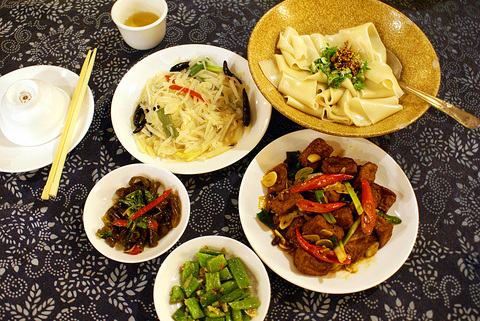Under its most infamous ruler Qin Shi Huang (秦始皇), the Qin Dynasty (秦朝) was a time marked by the centralization of government and codification of laws. According to Lin Hui-lin (林惠玲), owner of Qin Wei Guang, it was also a time when the emperor systematically categorized the history and ingredients of many dishes from the region that is today called Shaanxi Province (陝西).
Lin tells this and a bevy of other stories as she explains the origins and uses of the tapestries adorning the celebrity-signed walls, the patterns on the tablecloths covering the hardwood tables and the dishes on the menu. Even the corn, red peppers and garlic hanging out front of the restaurant serve as the foundation for a story about differing weather conditions between steamy Taipei and temperate Xian (西安), Shaanxi's capital city. It's this attention to detail that has made Qin Wei Guan a staple on many a gourmand's list of eateries to frequent.
The food Lin serves is as hearty as her stories. As Shaanxi cuisine is influenced by the numerous Muslims living in the area, the menu consists mainly of beef, lamb, broad-cut noodles and paomo — a broth stewed for a day and served with un-leavened bread. To accommodate local palettes, Lin has added fish, pork, and tofu to the menu.

PHOTO COURTESY OF YULI KIM
We started off with Hu Pi Hui (NT$160) — a mixture of green pepper, fried tofu and hot bean sauce — and cut broad noodles (NT$90). Cut broad noodles are a staple of Shaanxi and ours were served in a large bowl with chopped green onions and Lin's special chili paste, which, when mixed together, was simple but delicious.
For the main course we ordered Zhi Zi Gu Pai, or spareribs/spices (NT$360), a dish that is marinated, steamed, fried and baked before being brought to the table. The outer skin is crispy with the meat inside moist and succulent.
Halfway through our meal two dessert pastries arrived at our table. After a minute, one of the servers noticed that the delicate desserts were getting cold and told us to eat them. Only later did Lin tell us that it is the custom to eat dessert halfway through dinner.
"The sugary dessert helps with digestion and increases the appetite so that more food can be eaten," Lin said.

Exceptions to the rule are sometimes revealing. For a brief few years, there was an emerging ideological split between the Democratic Progressive Party (DPP) and Chinese Nationalist Party (KMT) that appeared to be pushing the DPP in a direction that would be considered more liberal, and the KMT more conservative. In the previous column, “The KMT-DPP’s bureaucrat-led developmental state” (Dec. 11, page 12), we examined how Taiwan’s democratic system developed, and how both the two main parties largely accepted a similar consensus on how Taiwan should be run domestically and did not split along the left-right lines more familiar in

This month the government ordered a one-year block of Xiaohongshu (小紅書) or Rednote, a Chinese social media platform with more than 3 million users in Taiwan. The government pointed to widespread fraud activity on the platform, along with cybersecurity failures. Officials said that they had reached out to the company and asked it to change. However, they received no response. The pro-China parties, the Chinese Nationalist Party (KMT) and Taiwan People’s Party (TPP), immediately swung into action, denouncing the ban as an attack on free speech. This “free speech” claim was then echoed by the People’s Republic of China (PRC),

As I finally slid into the warm embrace of the hot, clifftop pool, it was a serene moment of reflection. The sound of the river reflected off the cave walls, the white of our camping lights reflected off the dark, shimmering surface of the water, and I reflected on how fortunate I was to be here. After all, the beautiful walk through narrow canyons that had brought us here had been inaccessible for five years — and will be again soon. The day had started at the Huisun Forest Area (惠蓀林場), at the end of Nantou County Route 80, north and east

Specialty sandwiches loaded with the contents of an entire charcuterie board, overflowing with sauces, creams and all manner of creative add-ons, is perhaps one of the biggest global food trends of this year. From London to New York, lines form down the block for mortadella, burrata, pistachio and more stuffed between slices of fresh sourdough, rye or focaccia. To try the trend in Taipei, Munchies Mafia is for sure the spot — could this be the best sandwich in town? Carlos from Spain and Sergio from Mexico opened this spot just seven months ago. The two met working in the